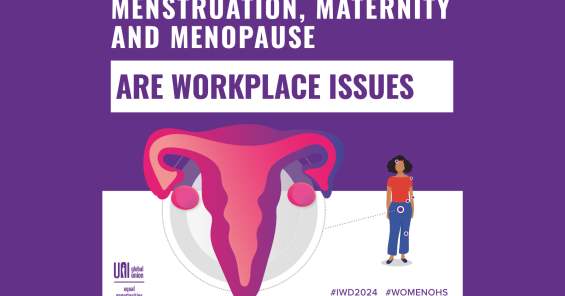UNI launches trade union manuals to address menstruation, maternity and menopause in the workplace
07.10.24

Today, on the World Day for Decent Work, UNI Global Union’s Equal Opportunities department is releasing three crucial manuals for trade unionists and workers worldwide, focusing on the Three ‘M’s – menstruation, maternity and menopause.
Although the Three ‘M’s are all natural biological experiences, they remain taboo topics across many cultures and workplaces. This often leads to the neglect of workers’ rights and needs, affecting their physical and emotional well-being, and ultimately impacting their ability to thrive in their professional lives.
The manuals are practical guides aimed at equipping trade unionists to fight for better policies and support systems in their workplaces. Activities such as debunking myths, conducting gender-sensitive risk assessments and negotiating model agreements are key features included in the manuals to foster understanding and action.
Veronica Fernandez Mendez, Head of Equal Opportunities at UNI Global Union, said: “It is crucial for trade unions to consider occupational safety through a gender lens. By acknowledging the unique needs of workers facing menstruation, maternity and menopause, we take essential steps to reduce inequalities and ensure that workplaces are inclusive for all. Together, we can break the silence, dismantle the stigma and ensure that everyone has the right to work with dignity and respect, at every stage of life.”
- Menstruation Manual:
The Menstruation manual aims to dismantle myths and address the workplace challenges faced by menstruating workers. It highlights the lack of access to adequate sanitation, the ongoing stigma, and how these factors exacerbate health conditions like endometriosis and anaemia. The manual also provides guidelines for trade unions on how to support menstruating workers, such as negotiating menstrual leave policies, ensuring access to sanitary facilities, and advocating for privacy and dignity in the workplace. Link to manual.
- Maternity Manual:
The Maternity manual explores the impact of maternity on workers and the systemic inequalities faced by pregnant and breastfeeding women. It provides practical guidance on implementing maternity protection, including safe working conditions and paid leave. The manual also discusses the role of trade unions in pushing for better maternity policies that account for surrogacy, adoption and the care crisis faced by women globally. It emphasizes the importance of collective bargaining to secure adequate rights for women before, during and after maternity. Link.
- Menopause Manual:
The Menopause manual provides insights into the biological, psychological and social changes associated with menopause. It focuses on the challenges faced by menopausal women in the workplace, including a lack of awareness and support, as well as harassment and discrimination. The manual offers a framework for trade unions to support menopausal workers by negotiating risk assessments, creating flexible working arrangements and addressing workplace conditions that may worsen symptoms, such as inadequate ventilation or uncomfortable uniforms. Link
You may also be interested in

Bank workers rising in Croatia
17.04.25
News
Meetings & Events
2025
28
Apr
Protected: UNI Europa FATIMA Project – ICTS Workshop – Leuven – 28 April 2025
ICT & Related Services
Dear Colleagues,
We would like to invite you to the sector workshop for ICTS in the framework of the UNI Europa project on “Fair Working Time Matters” (FATIMA). The event will take place on 28 April 2025 in Leuven, Belgium. The meeting will start at 09:00 CEST and end at 16:30 CEST.
29
Apr
03
Jun
